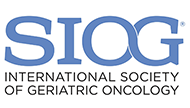Older individuals make up a large part of the cancer population, and there are important specific considerations for this population. The SIOG Task Forces assess available evidence on various cancer types in older individuals, and provide evidence-based recommendations for the diagnosis and treatment in such individuals.
This page provides information on SIOG Task Forces and the related position papers and consensus statements. These are intended to provide the user with a set of recommendations for the best standards of cancer care in the elderly, based on the findings of evidence-based medicine. Published SIOG Guidelines are available on the following topics:


